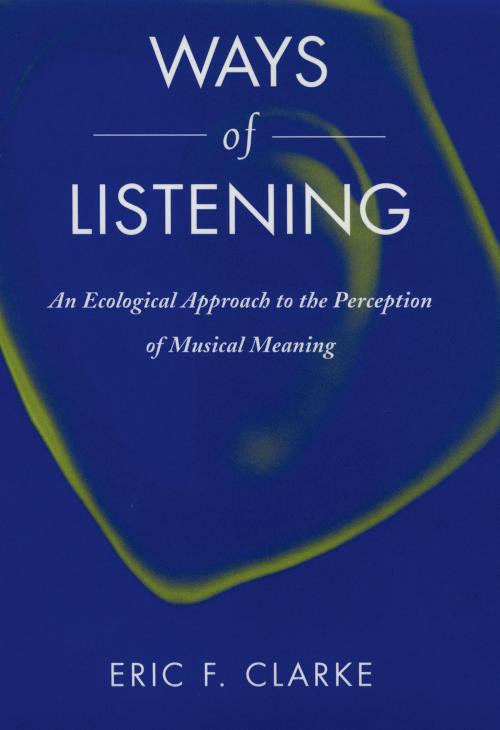Ways of Listening
An Ecological Approach to the Perception of Musical Meaning
Nonfiction, Entertainment, Music, Theory & Criticism, Theory, Health & Well Being, Psychology, Cognitive Psychology| Author: | Eric Clarke | ISBN: | 9780190288167 |
| Publisher: | Oxford University Press | Publication: | July 21, 2005 |
| Imprint: | Oxford University Press | Language: | English |
| Author: | Eric Clarke |
| ISBN: | 9780190288167 |
| Publisher: | Oxford University Press |
| Publication: | July 21, 2005 |
| Imprint: | Oxford University Press |
| Language: | English |
In recent years, many psychologists and cognitive scientists have published their views on the psychology of music. Unfortunately, this scientific literature has remained inaccessible to musicologists and musicians, and has neglected their insights on the subject. In Ways of Listening, musicologist Eric Clarke explores musical meaning, music's critical function in human lives, and the relationship between listening and musical material. Clarke outlines an "ecological approach" to understanding the perception of music. The way we hear and understand music is not simply a function of our brain structure or of the musical "codes" given to us by culture, Clarke argues. Instead, cognitive, psychoacoustical, and semiotic issues must be considered within the physical and social contexts of listening. In essence, Clarke adapts John Gibson's influential ecological theory of perception to the complex process of perceiving music. In addition to making a theoretical argument, the author offers a number of case studies to illustrate his concept. For example, he analyzes the experience of listening to Jimi Hendrix's performance of the Star Spangled Banner at Woodstock in 1969. Clarke examines how Hendrix's choice of instrument and venue, use of distortion, and the political climate in which he performed all had an impact on his audience's perception of the anthem. A complex convergence of broad cultural contexts and specific musical features - the entire "ecology" of the listening experience - is responsible for this performance's impact. Including both the best psychological research and careful musicological scholarship, Clarke's book offers the most complex and insightful perspective on musical meaning to date. It will be of interest to musicologists, musicians, psychologists, and scholars of aesthetics.
In recent years, many psychologists and cognitive scientists have published their views on the psychology of music. Unfortunately, this scientific literature has remained inaccessible to musicologists and musicians, and has neglected their insights on the subject. In Ways of Listening, musicologist Eric Clarke explores musical meaning, music's critical function in human lives, and the relationship between listening and musical material. Clarke outlines an "ecological approach" to understanding the perception of music. The way we hear and understand music is not simply a function of our brain structure or of the musical "codes" given to us by culture, Clarke argues. Instead, cognitive, psychoacoustical, and semiotic issues must be considered within the physical and social contexts of listening. In essence, Clarke adapts John Gibson's influential ecological theory of perception to the complex process of perceiving music. In addition to making a theoretical argument, the author offers a number of case studies to illustrate his concept. For example, he analyzes the experience of listening to Jimi Hendrix's performance of the Star Spangled Banner at Woodstock in 1969. Clarke examines how Hendrix's choice of instrument and venue, use of distortion, and the political climate in which he performed all had an impact on his audience's perception of the anthem. A complex convergence of broad cultural contexts and specific musical features - the entire "ecology" of the listening experience - is responsible for this performance's impact. Including both the best psychological research and careful musicological scholarship, Clarke's book offers the most complex and insightful perspective on musical meaning to date. It will be of interest to musicologists, musicians, psychologists, and scholars of aesthetics.















